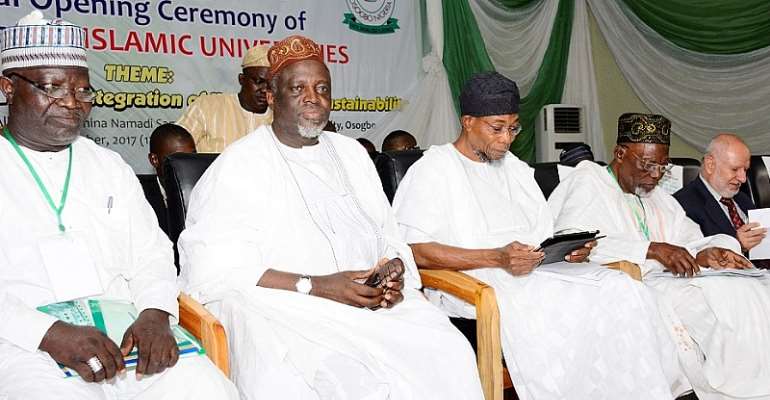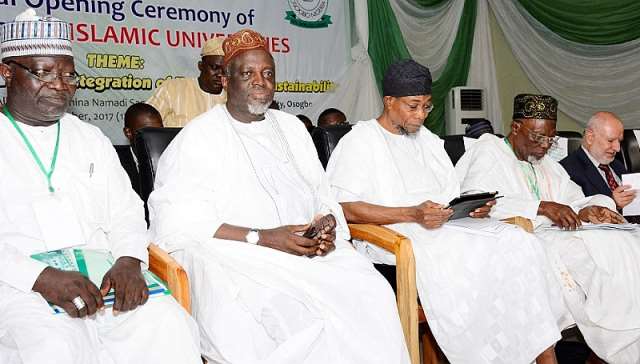Islamic universities charged on knowledge integration

Islamic universities across the world have been charged on integration of knowledge by providing spiritual training for the students in addition to offering quality and standard education.
This charge was contained in a communiqué issued at the end of a conference organised by the International Institute of Islamic Thought (IIIT) in collaboration with the Fountain University, Osogbo and the Islamic Education Trust held at the Amina Namadi Sambo Auditorium, Fountain University, Osogbo, Osun State.
The communiqué which was read by the Vice Chancellor of Fountain University, Professor Abdlulateef Usman recommended that Islamic perspective of the contents of every course in all Islamic university must be integrated into teaching and learning process.
The governor of Osun State, Mr Rauf Aregbesola who declared the conference open lauded the organizers for focusing on the issues of integration of knowledge and sustainability of Islamic universities.
The Sultan of Sokoto and President-General of the Nigerian Supreme Council for Islamic Affairs (NSCIA), Alhaji Muhammad Sa'ad Abubakar who was represented by the Executive Secretary of the Muslim Ummah of South West Nigeria (MUSWEN), Professor Daud Naibi said the recommendations of the conference would promote scholarship among Muslims.
The Registrar of the Joint Admissions and Matriculation Board, Professor Ishaq Oloyede while delivering a keynote address at the conference urged university scholars to be upright and rescue the society from corruption so as to pave way for abundant wealth among the people.
Professor Fathi Malkawi from Jordan and Dr Rihab Abdulrahaman Alsherif from Al-jazeerah University, Sudan were among foreign scholars that delivered papers during the conference.
According to the communiqué, “Islamic universities all over the world were established primarily to solve societal problems through the provision of quality learning in addition to the provision of spiritual training for the students. Therefore, these universities should hold on to these principles.”
“The integration of knowledge should be pragmatic by integrating the theoretical approach to teaching-learning into a tool for conducting developmental research capable of transforming human societies.”
The conference also urged Islamic universities to accord priority to Arabic and Islamic Studies and to simplify them to encourage their students to study the two courses.
“Islamic Universities should be in the vanguard of promoting the concept of integration of knowledge in the society with a view to bridging the gap between the gown and town by organising workshops, seminars and civic engagement with stakeholders outside the universities.”
“With the spate of societal challenges, the intervention of Islamic universities is non-negotiable and therefore required in solving the problem of the dearth of teachers and students in public schools.”
The conference also urged Islamic Universities to come together and establish partnership with other universities with the objective of knowledge sharing.
The communiqué added “The proprietors of Islamic universities should see the development of universities as a continuous exercise. Continuous financial support of the proprietor of the universities is essential for the survival, growth and development of Islamic universities.”
“In line with the policies of their respective countries, Islamic Universities should design a curriculum that will include the integration of Islamic teachings into the modern knowledge.
“Islamic Universities and the Muslim Ummah in general should not only bother about the dwindling education of the Muslims, they should also be concerned with the ways to ameliorate the challenges.
“Islamic Universities should justify the giant strides of the early predecessors in science and technology by rising to the task of expanding their faculties to include colleges of health sciences and faculty of technology.
“Muslim Universities should make use of the vast knowledge and impressive credentials of retired Muslim professors to attract grants and enhance collaboration and linkages with international institutions.”
“In order to achieve the sustainability of the roles and objectives of the Islamic universities in knowledge integration, Islamic Universities should intensify efforts at ensuring promotion of quality education that combines theory with practice.
“Islamic universities should continue to charge affordable fees to address the problem of many poor Muslims who are unable to afford high and exorbitant fees to acquire university education.
“Founders of Islamic Universities should not rely solely on the charitable donations; they should rather explore other creative means of generating revenue for the university.”

(Left to Right) Vice Chancellor,Fountain University, Osogbo, Abdullateef Usman, Registrar, Joint Admissions & Matriculation Board (JAMB), Professor Is-haq Oloyede, Governor of Osun State, Mr Rauf Aregbesola, ExecutiveSecretary, Muslim Ummah of South West of Nigeria (MUSWEN) and representative of the Sultan of Sokoto, Professor Daud Noibi and the Regional Director of IIIT in Jordan, Professor Fathi Malkawi during the conference in Osogbo.
